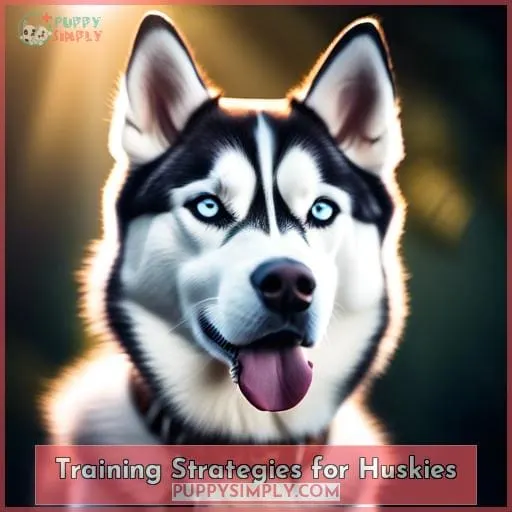This site is supported by our readers. We may earn a commission, at no cost to you, if you purchase through links.
 You might wonder just how smart your husky can be, given their reputation for stubbornness. Huskies are indeed intelligent, but their smarts manifest in unique ways that set them apart from other breeds.
You might wonder just how smart your husky can be, given their reputation for stubbornness. Huskies are indeed intelligent, but their smarts manifest in unique ways that set them apart from other breeds.
Their intelligence is shaped by their history as sled dogs, requiring independent thinking and problem-solving skills. Understanding their communication style and how they learn can make training more effective.
Embrace their cleverness and learn to work with their independent nature, and you’ll discover the true extent of husky intelligence.
Table Of Contents
Key Takeaways
- Huskies are intelligent with unique problem-solving skills and an independent nature, which can sometimes be mistaken for stubbornness.
- They may not perform well on traditional obedience tests, but they excel in communication and can be quick learners when motivated properly.
- Training a husky requires patience and positive reinforcement, such as clicker training and high-value rewards, to accommodate their independent thinking.
- Huskies are known for their escape artist tendencies, so secure containment and supervision are crucial, along with mental stimulation to prevent boredom-related behaviors.
Husky Intelligence How Smart Can You Expect Them to Be
Husky intelligence is marked by their problem-solving skills and adaptability, making them smart but sometimes stubborn companions.
Understanding Stubbornness in Dogs
When you’re trying to teach your furry friend a new trick and they give you that look, you know the one – it’s easy to label them as stubborn. But let’s get real, calling our dogs hard-headed might just be barking up the wrong tree.
Stubbornness in dogs often boils down to a cocktail of untrained behavior, lack of motivation, and a misunderstanding of dog psychology. It’s like they’re solving a puzzle, and we haven’t given them all the pieces yet.
Training isn’t just about obedience; it’s about communication, understanding their needs, and turning problem-solving into a game. So, before you write off your pooch as one of those stubborn dogs, remember, it’s not about being headstrong, it’s about finding the right key to unlock their potential.
Let’s ditch the stubborn label and focus on building a bridge of understanding and motivation through effective dog training and behavior management.
Measuring Dog Intelligence
When it comes to understanding your dog’s intelligence, it’s essential to recognize that intelligence in dogs, much like in humans, varies widely and can be measured in different ways. You might be curious about how your husky stacks up in terms of smarts. Huskies, known for their independent nature, may not always excel in traditional obedience-based intelligence tests, but this doesn’t mean they’re not intelligent.
They possess a unique kind of intelligence that includes problem-solving skills, communication abilities, and independent thinking.
To gauge your dog’s intelligence, consider conducting some simple tests at home. These can range from hiding treats under cups to see if your dog can track the treat, to covering them with a towel to assess their problem-solving skills.
Remember, the goal of these tests isn’t to label your dog as smart or not but to understand how they think and learn. This understanding can significantly enhance your training sessions and strengthen your bond.
General Dog Intelligence
When sizing up dog smarts, don’t get hung up on intelligence rankings.
Sure, some breeds are more biddable, acing trainability assessments with flying colors.
But remember, dog personality types vary widely.
A husky’s intelligence, for instance, mightn’t shine in a standard obedience test, but give them a problem to solve and watch their independent genius come alive.
Keep that clicker handy!
Making Generalizations by Breed
When you’re sizing up a dog’s smarts, remember, breed stereotypes don’t tell the whole story.
Huskies, often pegged as independent escape artists, might defy obedience expectations, not because they’re thick, but because they’re quick learners with their own agenda. Training challenges? Absolutely. But it’s their unique intelligence that turns training into a puzzle-solving adventure.
Huskies’ Unique Intelligence
Huskies showcase a remarkable blend of intelligence traits that set them apart from other breeds.
Their ability to solve problems, communicate effectively, and learn quickly makes them unique, yet challenging to train.
Communication
Huskies are chatterboxes of the dog world, using a symphony of howls and whines to express their thoughts.
This knack for husky communication deepens the dog-human bond, showcasing their empathy.
Understanding huskies means tuning into their unique language, a blend of vocal cues and body language that turns every interaction into a dance of mutual respect and affection.
Problem-solving
Huskies are master escape artists. Their problem-solving strategies are top-notch, often outwitting the best of us.
To keep their cognitive abilities sharp, try environmental enrichment. Brain games not only offer mental stimulation but also prevent those Houdini-like antics.
Independent Thinking
Continuing from Huskies’ knack for problem-solving, their independence really shines through. You’ll find their curiosity often leads to adventures, sometimes in the form of escapes.
It’s not that they’re looking for trouble, but rather, they’re wired to explore and solve problems on their own terms.
Escape Artists
As a Husky owner, you’re in for a clever game of keep the escape artist in the yard. These brainy canines are notorious for turning your fencing solutions into puzzles to solve.
- Reinforcing escape routes with digging deterrents.
- Upgrading confinement methods to outsmart their Houdini acts.
- Installing tracking devices for peace of mind.
- Regularly inspecting and maintaining your fencing to prevent breakout performances.
Quick Learners
Huskies are the Houdinis of the dog world, showcasing their unique intelligence as quick learners and masterful escape artists.
Their knack for problem-solving isn’t just about breaking free; it’s a testament to their independent thinking.
You’ll often find them outsmarting the most cunning of puzzles, proving that their brains are as sharp as their howls.
They’re not just smart; they’re brilliantly clever.
Training Strategies for Huskies
To effectively train your Husky, embracing positive reinforcement is key.
By managing distractions and using high-value rewards, you’ll tap into their unique intelligence and foster obedience.
Positive Reinforcement
When training your Husky, positive reinforcement is your secret sauce. Here’s a quick guide:
- Use clicker training to mark good behavior; it’s like saying Bingo!
- Keep treats handy to maintain motivation—think of them as four-legged fuel.
- Stay consistent; dogs are routine lovers, not routine breakers.
- Patience is key—remember, Rome wasn’t built in a day, and neither is a well-trained Husky.
Managing Distractions
After mastering positive reinforcement, it’s time to tackle leash training amidst environmental distractions.
Huskies, with their explorer’s spirit, can find calmness training a game of wits. Use clicker training to mark moments of focus, turning bustling parks into classrooms.
Reward-based training isn’t just about treats; it’s about celebrating those aha moments together, making every walk a step towards mutual understanding and respect.
High-Value Rewards
Continuing from the buzz of managing distractions, let’s dive into the treat trove for motivating huskies.
You’ve got to be a bit of a treat detective, selecting those irresistible morsels that get your husky’s tail wagging like a metronome.
When you’re clicker training huskies, these treats are your currency for fostering independence and engaging those clever husky minds. Remember, treating selectively isn’t about spoiling—it’s strategic, like playing chess with treats.
So, next time you’re in a standoff with your furry Houdini, whip out that top-shelf snack and watch them tune in.
Husky Owners’ Perspectives
As you’ve learned the ropes of training your husky, you’ll find that husky owners have a unique take on their furry companions’ smarts.
- Huskies aren’t just smart; they’re masters of husky communication, often conveying their needs in ways that go beyond the basic bark.
- Problem-solving huskies can turn any tricky situation into a game, finding solutions that might just outsmart their human counterparts.
- Independent husky thinkers don’t just follow the pack; they make their own paths, sometimes literally, as escape artist huskies.
- Their quick learning ability means they’re always a step ahead, whether it’s figuring out puzzles or learning new commands.
Embrace the challenge and revel in the joy of sharing your life with these clever canines.
Rethinking Husky Stubbornness
When you’re tackling the training challenges of a husky, it’s time to toss the stubborn label out with the bathwater.
These pooches may ace intelligence tests, but their breed characteristics include a strong-willed temperament that can clash with owner expectations.
Understanding their independent streak means adjusting your approach. Instead of a drill sergeant, be a guide who rewards their eureka moments.
Frequently Asked Questions (FAQs)
How do Huskies handle hot climates?
Huskies can adapt to warmer climates, but they’re like furry snowballs in the desert—out of their element.
Keep ’em hydrated, cool, and out of the midday sun, and they’ll be chasing mirages instead of sleds.
Can Huskies be service animals?
Oh, the irony of choosing a husky as a service animal! You’d think with their wolf-like independence and sled-pulling heritage, they’d be more suited to leading a pack across the Arctic than assisting in daily tasks.
Yet, here we are, contemplating their role as service dogs. Despite their stubborn streak and boundless energy, huskies can indeed make great service animals for those willing to invest in rigorous training.
Their intelligence and loyalty shine through with the right guidance, proving that even the most free-spirited breeds can adapt to serve and support their humans.
So, if you’re up for the challenge, a husky might just surprise you by becoming an invaluable companion, turning the notion of a traditional service dog on its head.
Are Huskies suitable for apartment living?
Huskies can adapt to apartment living if you’re ready to tackle their high energy with daily exercise and mental stimulation.
They’re escape artists, so prepare for a fur-lined, howl-filled home!
How do Huskies interact with small pets?
Huskies, with their strong prey drive, can be a gamble around small pets; they might see them as a squeaky toy rather than a pal.
Early socialization is key—without it, it’s like mixing oil and water!
What is the lifespan of a Husky?
You’re in for a treat with a Husky; they’re not just a pretty face but a bundle of energy and smarts wrapped in fur.
Expect them to be by your side, making memories for about 12 to 15 years. They’re like the marathon runners of the dog world, built for the long haul.
Keep ’em active, happy, and healthy, and you’ll have a loyal companion who’s ready to join in on all your adventures, from couch marathons to actual marathons.
Conclusion
So, you thought outsmarting a husky was going to be a walk in the park? Think again. Their intelligence, shaped by centuries of sled-pulling, isn’t just about fetching or sitting on command.
It’s about communication, problem-solving, and a dash of Houdini-esque escapism. By understanding and embracing their unique smarts, you’ll find training your husky not just effective, but rewarding.











